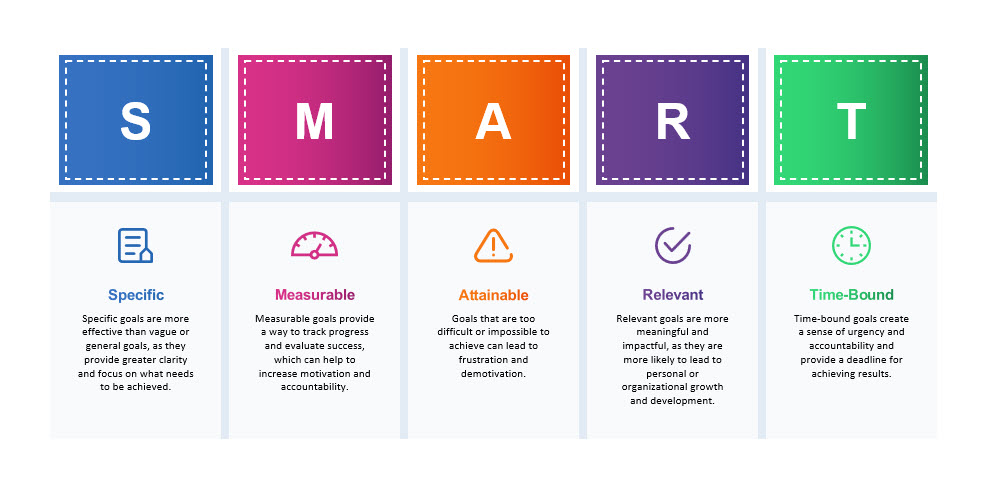Table of Contents
SMART goals are a popular and effective framework for setting and achieving objectives in both personal and professional settings. The acronym SMART stands for Specific, Measurable, Achievable, Relevant, and Time-bound, which provides a structured approach to defining goals that are well-defined, quantifiable, feasible, aligned with personal or organizational objectives, and set within a specific timeframe.
The importance of setting SMART goals lies in their ability to provide clarity and focus on what needs to be accomplished, as well as create a sense of urgency and accountability. Without clear goals, individuals and organizations may struggle to make progress or feel overwhelmed by the sheer number of tasks they need to complete.
By setting SMART goals, individuals and organizations can break down complex tasks into smaller, more manageable steps, which can help to increase motivation and productivity. SMART goals also provide a way to measure progress and evaluate success, which can help individuals and organizations identify improvement areas and adjust their strategies accordingly.
Now, let’s take a look at the specifics of SMART goals and how you can use this framework.
The Acronym SMART
The acronym SMART is a framework for setting and achieving goals that consist of five key components: Specific, Measurable, Achievable, Relevant, and Time-bound. Each letter in the SMART acronym represents a different aspect of goal-setting that is critical for success.
The first letter, S, stands for Specific and emphasizes the importance of defining clear and specific goals. Specific goals are more effective than vague or general goals, as they provide greater clarity and focus on what needs to be achieved.
The second letter, M, stands for Measurable, which means that goals should be quantifiable and measurable. Measurable goals provide a way to track progress and evaluate success, which can help to increase motivation and accountability.
The third letter, A, stands for Achievable and emphasizes the importance of setting realistic and attainable goals. Goals that are too difficult or impossible to achieve can lead to frustration and demotivation.
The fourth letter, R, stands for Relevant, which means that goals should be aligned with personal or organizational objectives. Relevant goals are more meaningful and impactful, as they are more likely to lead to personal or organizational growth and development.
The final letter, T, stands for Time-bound and emphasizes the importance of setting goals within a specific timeframe. Time-bound goals create a sense of urgency and accountability and provide a deadline for achieving results.
Each letter in the SMART acronym represents a critical component of goal-setting that is essential for success.
SMART Goals Examples
SMART goals can be applied to a wide range of personal and professional development areas.
Here are some examples of SMART goals that can help individuals achieve their desired outcomes:
- Career Development: “Increase my sales revenue by 20% within the next six months by building new client relationships and improving my sales techniques.”
- Fitness: “Lose 10 pounds in the next three months by exercising for 30 minutes a day, five days a week, and following a balanced diet.”
- Education: “Earn a certification in project management within the next six months by attending a training course, studying for the exam, and passing it with a score of 80% or higher.”
- Personal Finance: “Save $5,000 for a down payment on a house within the next year by creating a budget, reducing my expenses, and increasing my income.”
- Time Management: “Reduce my time spent on social media by 50% within the next month by limiting my usage to 30 minutes a day and using a timer to track my time.”
By defining specific, measurable, achievable, relevant, and time-bound goals, individuals can focus their efforts and track their progress, ultimately leading to greater success and personal growth.
SMART Goals Benefits
Setting SMART goals can provide numerous benefits for individuals and organizations.
Here are some of the key benefits of using SMART goals:
- Increased motivation: Setting specific and achievable goals can provide individuals with a sense of purpose and direction, which can increase motivation and engagement. SMART goals can also help individuals to visualize their desired outcomes, which can further enhance motivation.
- Better focus: SMART goals provide a clear and well-defined path to achieving objectives, which can help individuals to focus their efforts and avoid distractions. By breaking down complex tasks into smaller, more manageable steps, individuals can make progress toward their goals more efficiently.
- Improved productivity: SMART goals provide a structured approach to goal-setting, which can help individuals to prioritize tasks and optimize their time. By setting specific deadlines and tracking progress, individuals can improve their productivity and achieve more in less time.
- Greater accountability: Setting SMART goals creates a sense of accountability, as individuals are responsible for achieving their objectives within a specific timeframe. This can help to increase motivation and ensure that individuals remain focused on their goals.
- Better decision-making: SMART goals provide a clear framework for decision-making, as individuals can evaluate their options based on how they align with their objectives. This can help individuals to make more informed decisions and achieve their desired outcomes more effectively.
Challenges of SMART Goals
While setting SMART goals can be a powerful tool for achieving personal and professional growth, there are several challenges that individuals may face when working towards their objectives.
Here are some common challenges associated with SMART goals:
- Lack of motivation: While setting specific and achievable goals can increase motivation, individuals may still struggle with maintaining their motivation over time. External factors such as stress, burnout, and unexpected setbacks can also impact motivation levels.
- Unrealistic expectations: Setting overly ambitious goals that are not achievable within a reasonable timeframe can lead to frustration and demotivation. Individuals may need to reassess their goals and adjust their expectations to ensure they remain achievable and realistic.
- Lack of resources: Achieving certain goals may require access to specific resources, such as time, money, or expertise. If these resources are not readily available, individuals may struggle to achieve their goals.
- Limited support: Achieving goals often requires support from others, such as colleagues, friends, or family members. If individuals lack the necessary support, they may struggle to achieve their objectives.
- Inadequate planning: Setting SMART goals requires careful planning and execution. Without a clear plan of action, individuals may struggle to make progress toward their objectives.
Achieving SMART Goals
Achieving SMART goals requires a combination of planning, focus, and execution.
Here are some practical tips and strategies to help individuals achieve their objectives:
- Break goals down into smaller tasks: Breaking down larger goals into smaller, more manageable tasks can make them less daunting and easier to achieve. This can also help individuals to track their progress more effectively.
- Create a plan of action: Developing a clear plan of action, including specific steps and deadlines, can help individuals to stay focused and make progress toward their goals. This can also help individuals to identify potential obstacles and develop strategies to overcome them.
- Prioritize tasks: Prioritizing tasks based on their importance and urgency can help individuals to optimize their time and focus their efforts on the most important tasks.
- Track progress: Regularly tracking progress toward goals can help individuals to stay motivated and identify areas where they may need to make adjustments. This can also help individuals to celebrate small successes along the way.
- Stay focused: Avoiding distractions and staying focused on goals can be challenging, but it is essential for achieving success. Strategies such as setting aside dedicated time for working towards goals, minimizing interruptions, and creating a conducive work environment can all help individuals to stay focused.
Conclusion
Setting and achieving SMART goals is a powerful tool for personal and professional development. The acronym SMART stands for Specific, Measurable, Achievable, Relevant, and Time-bound, and it provides a framework for setting clear goals, focused, and achievable.
By setting SMART goals, individuals can increase their motivation, focus, and productivity. They can also gain a sense of direction and purpose, and make progress toward their desired outcomes.
However, achieving SMART goals can also be challenging. Individuals may face obstacles such as a lack of motivation, unrealistic expectations, and limited resources. Overcoming these challenges requires commitment, discipline, and a willingness to adjust goals and strategies as needed.
To achieve success, individuals can employ practical tips and strategies, such as breaking down goals into smaller tasks, creating a plan of action, prioritizing tasks, tracking progress, and staying focused.
Have you tried using the SMART goals framework? Let me know your experience with it in the comments.



2 comments
[…] Goal: The objective or desired outcome that the user wants to achieve by using the feature. This should be specific, measurable, achievable, relevant, and time-bound (SMART). […]
[…] its priorities. The KPIs should be specific, measurable, achievable, relevant, and time-bound (SMART) to provide clarity and facilitate effective performance […]